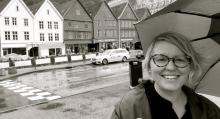Assistant Professor Olivia Gunn recently published two articles.
"Other Mothers and the Limits of Bohemia in Cora Sandel’s Alberte Trilogy" was published in Scandinavian Studies (Volume 88 Number 4). Here, Gunn considers how raced rhetoric affects the protagonist's efforts to express sympathy and solidarity with other women across race and culture lines. Alberte's attention to ethno-racial differences serves to redefine the boundaries of her Northern European, civil class selfhood and draws attention to the cultural capital that she wields as a French-speaker residing at the cosmopolitan heart of colonial Europe: Paris-métropole. Gunn argues that Sandel’s depictions of racialized differences among women complicate Alberte’s appeals to universal humanity, as well as the understanding that her bohemian life represents a clean break with her middle class background.
"Baby factory: Romance and reproduction in Norway’s first sound film" was published as a featured article in Journal of Scandinavian Cinema (Volume 6 Number 3). Engaging research on the family and women in industry during the interwar period in Norway, Gunn explores the conflict between labor and labor (motherhood and industry jobs) in Tancred Ibsen’s The Great Christening (1931). She argues that although this city film expresses great confidence in the working class kinship, it also conveys a subtly anti-industrial message, suggesting that true happiness is to be found in a greener location. “Baby factory” continues Gunn’s research on reproduction, which is also the central concept in her book project, Empty Nurseries, Queer Occupants: Reproduction in Ibsen’s Late Plays.
Olivia Gunn's research on Den Store Barnedåpen and The Alberta Trilogy
Submitted by Kayley Luhrs
on
